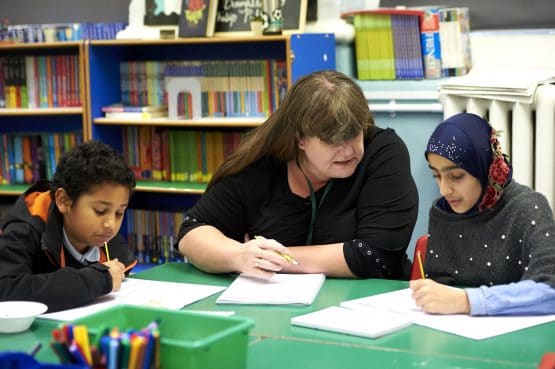
Partner as a school
Action Tutoring is an education charity with a long history of providing vital tutoring support to pupils facing disadvantage. Established in 2011, we’ve developed an effective tutoring programme with proven impact and minimal workload for schools.
We work with primary and secondary state schools to deliver heavily subsidised, high-quality tutoring for pupils in Years 5, 6, 7, 10 and 11, in English and maths.
Partner as a schoolWhen asked if they would recommend Action Tutoring to another school, teachers responded 9 out of 10
“Action Tutoring gives pupils a real chance to engage in real catch up interventions which might otherwise not be available to Pupil Premium pupils. [We’re] really grateful for the input. I feel the routine really helps pupils to progress. It`s a potential life changer!”
Steve Gittens, Executive Headteacher at Wallsend St. Peter’s in Newcastle
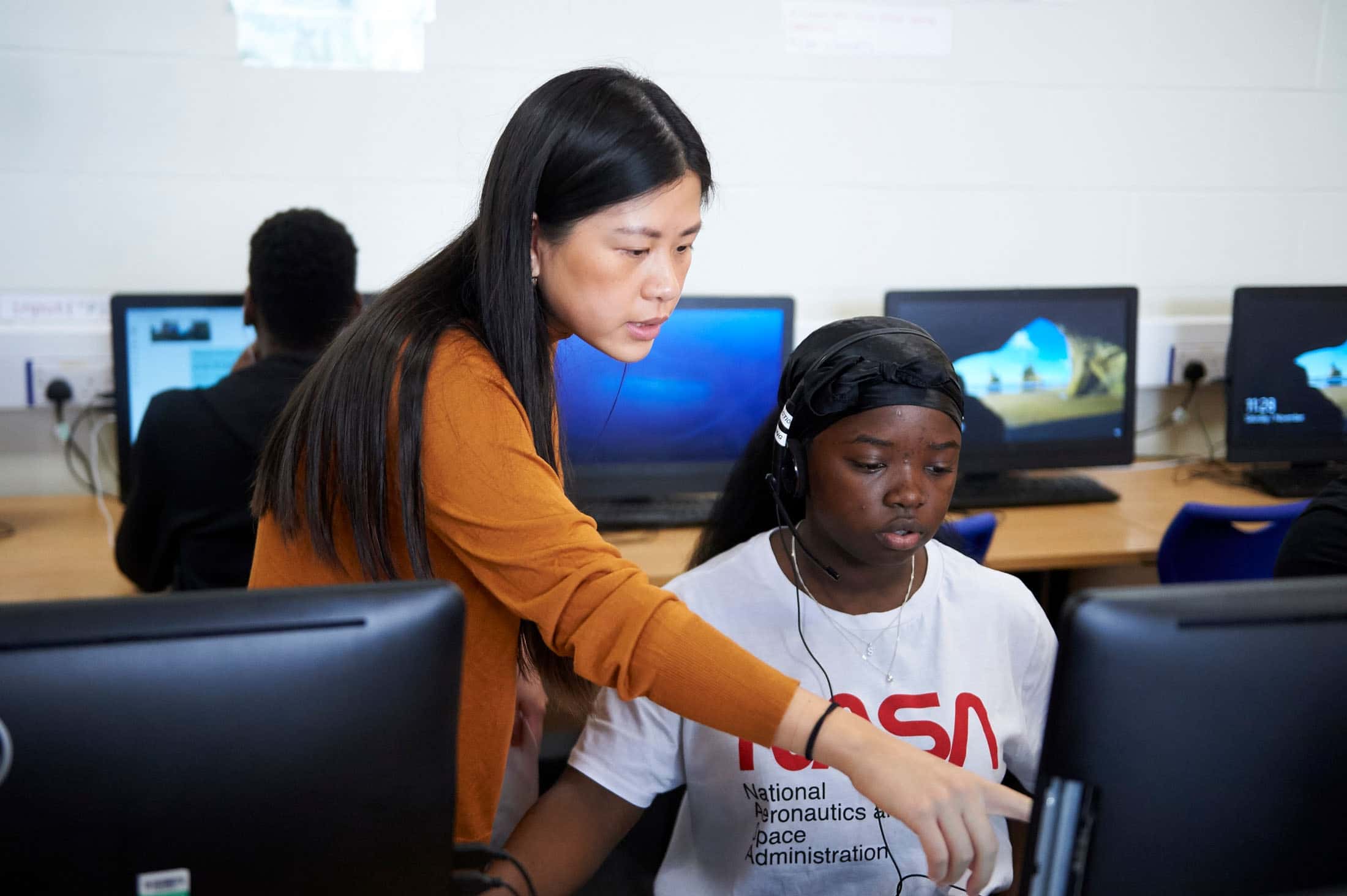
How our programmes work
We aim to deliver two programmes of 10-20 tutoring sessions (with two different cohorts of pupils) across the academic year.
Each programme provides small group tuition for 18-20 pupils and can be run in-person or online. Our Programme Coordinators oversee the delivery of tutoring and tutor quality assurance, ensuring minimal additional workload for teachers and schools. Sessions last for one hour and can run before, during or shortly after the school day, Monday to Friday.
Timings are agreed between the school and Action Tutoring to ensure high pupil attendance and engagement. There are no sessions during the school holidays.
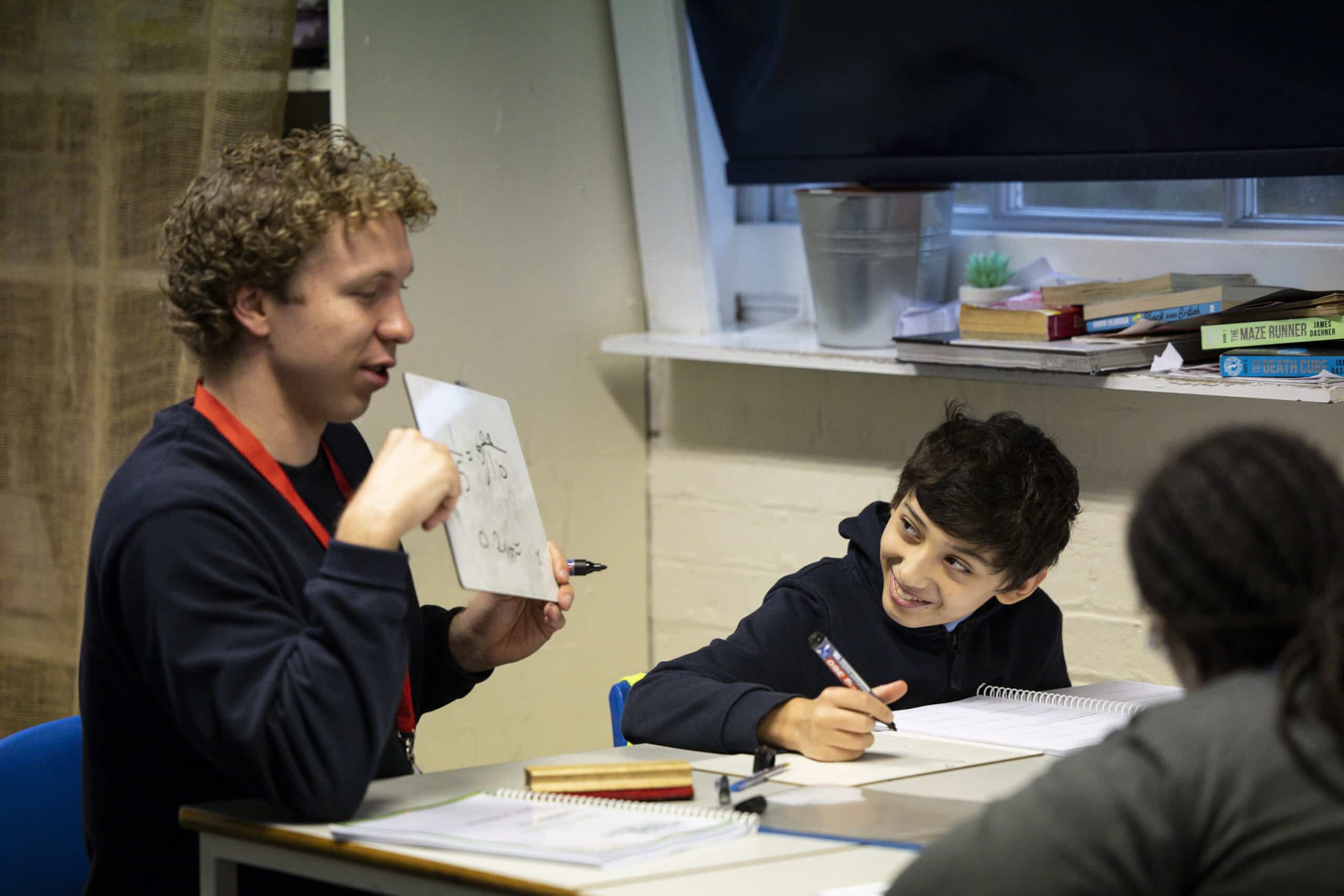
What’s the school’s role in the programme?
Get in touch to share the needs of your pupils, and we’ll work together to discuss which programme will suit you best.
You’ll select which pupils take part. At least 65% of the group must be eligible for Pupil Premium funding or Free School Meals.
Your dedicated Programme Coordinator will be in touch once details are confirmed and will come into school to run baseline assessments with the pupils. They will share the gaps in learning with both the school and our tutors, and then we’re ready to start!
We will provide weekly feedback on attendance and engagement. We will also run a progress assessment later in the programme and share a school report with you.
You can read our school guide here.
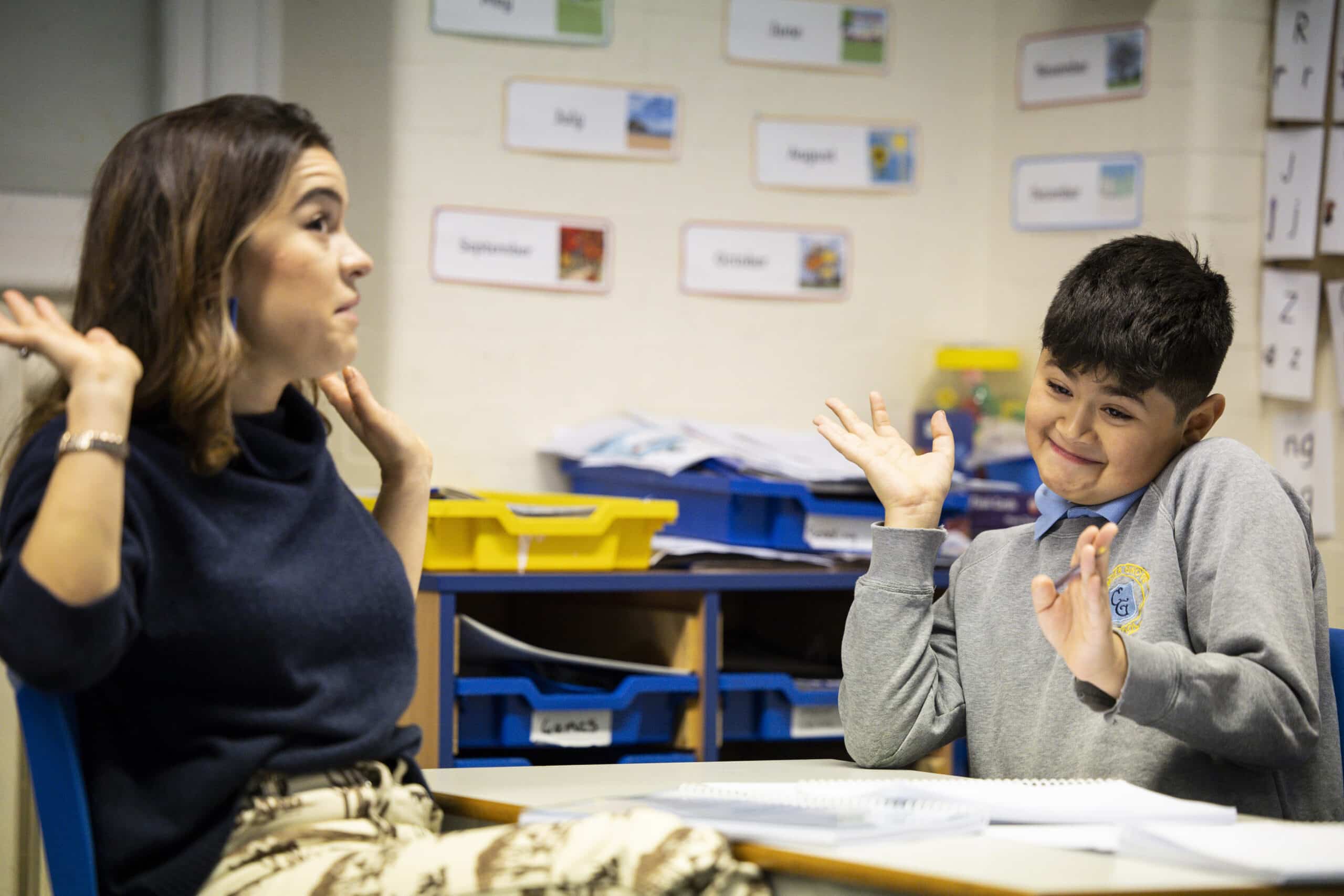
Curriculum
Our Curriculum team creates resources which are built on an evidence-based approach, reflecting current educational research and established pedagogy.
Our specialist Curriculum Leads for English and maths are fundamental to this, bringing a wealth of knowledge from their experiences as Lead Practitioners in schools.
Read more about our curriculum, training and quality assurance here.
You can view our sample sessions below.
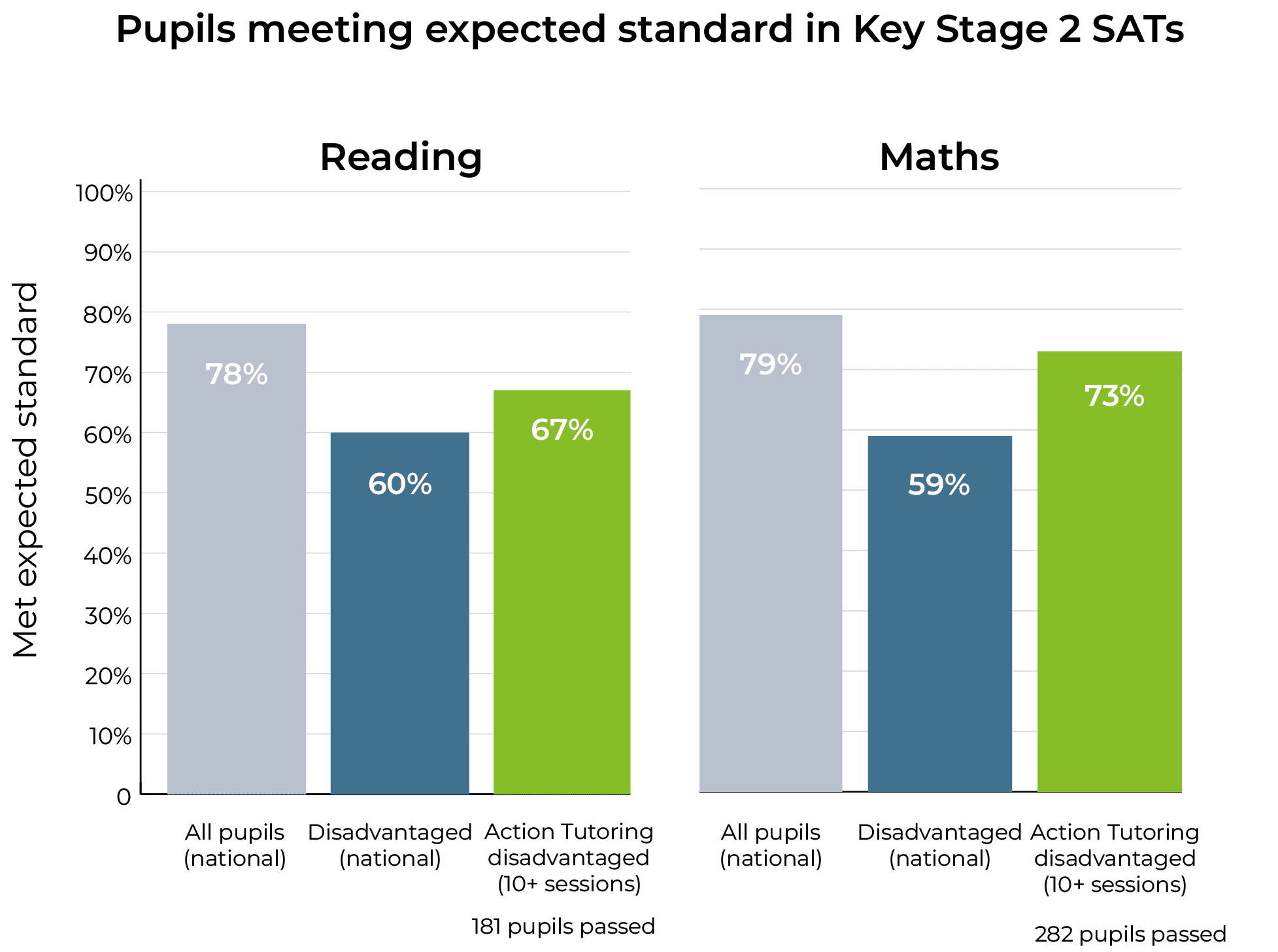
Programmes with proven impact
We invest strongly in evaluating the impact of our programmes, collecting baseline and progress assessment data, across all schools, in addition to the SATs and GCSE results of pupils we support. You can read our full 2022-23 report here.
After ten or more sessions with Action Tutoring, disadvantaged pupils were more likely to achieve the expected standards than other disadvantaged pupils across the country — by 7 percentage points in reading and 14 percentage points in maths.
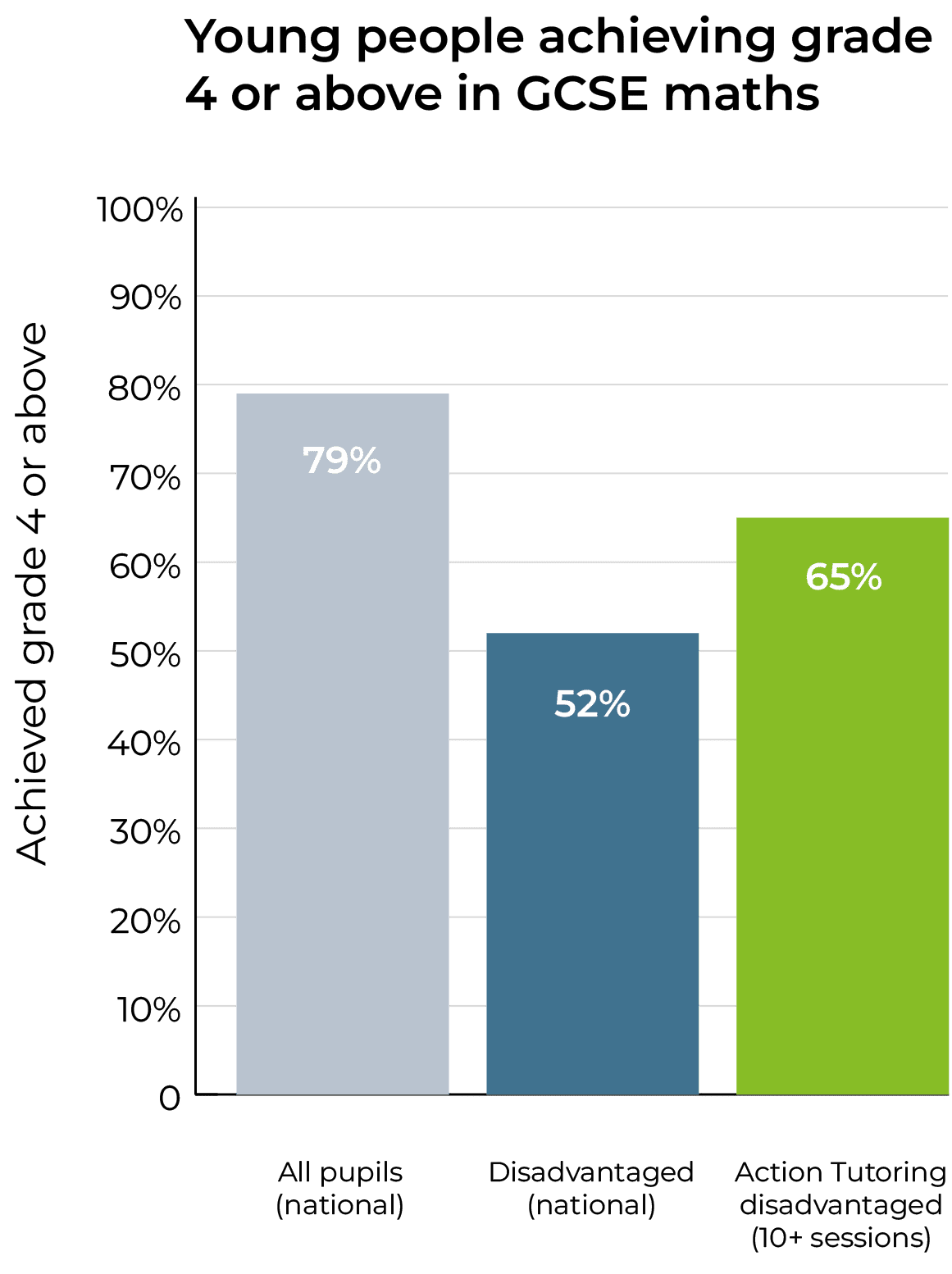
Action Tutoring’s pupils were nearly 13 percentage points more likely to pass maths GCSE than other disadvantaged pupils nationally. After attending at least 10 tutoring sessions, 65% of disadvantaged pupils passed their maths GCSE compared to 52% of other disadvantaged pupils nationally.
Action Tutoring ran a smaller Year 11 English programme in 2022–23, with 75 disadvantaged pupils attending ten or more tutoring sessions. While these pupils appear to have achieved a similar pass rate as previous years, Action Tutoring judged the sample to be too small to carry out robust comparative analysis with the national pass rate.
Action Tutoring continues to evaluate its Year 11 English programme throughout the academic year.
“Action Tutoring has been by far the best tutoring organisation we have worked with. The programmes are well organised and align with the school without adding additional pressures or constraints. We have seen direct impact for both our Year 7 and 11 cohorts, with significant progress in both maths and English.“
Deputy Principal at a school in Nottingham
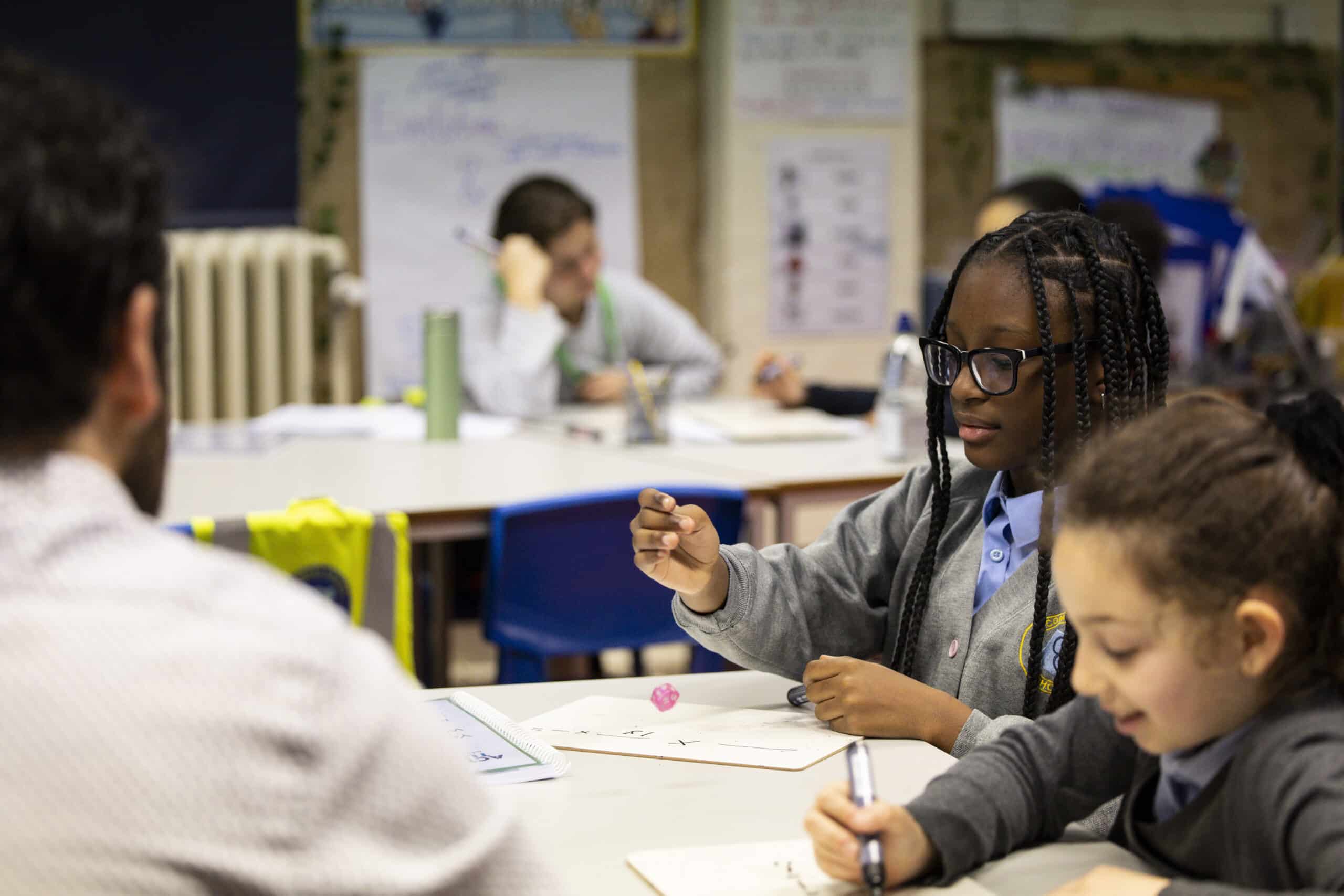
Costs
We understand the current pressures on school budgets, so we fundraise to heavily subsidise the cost of our programmes, meaning schools pay just 30% of all costs.
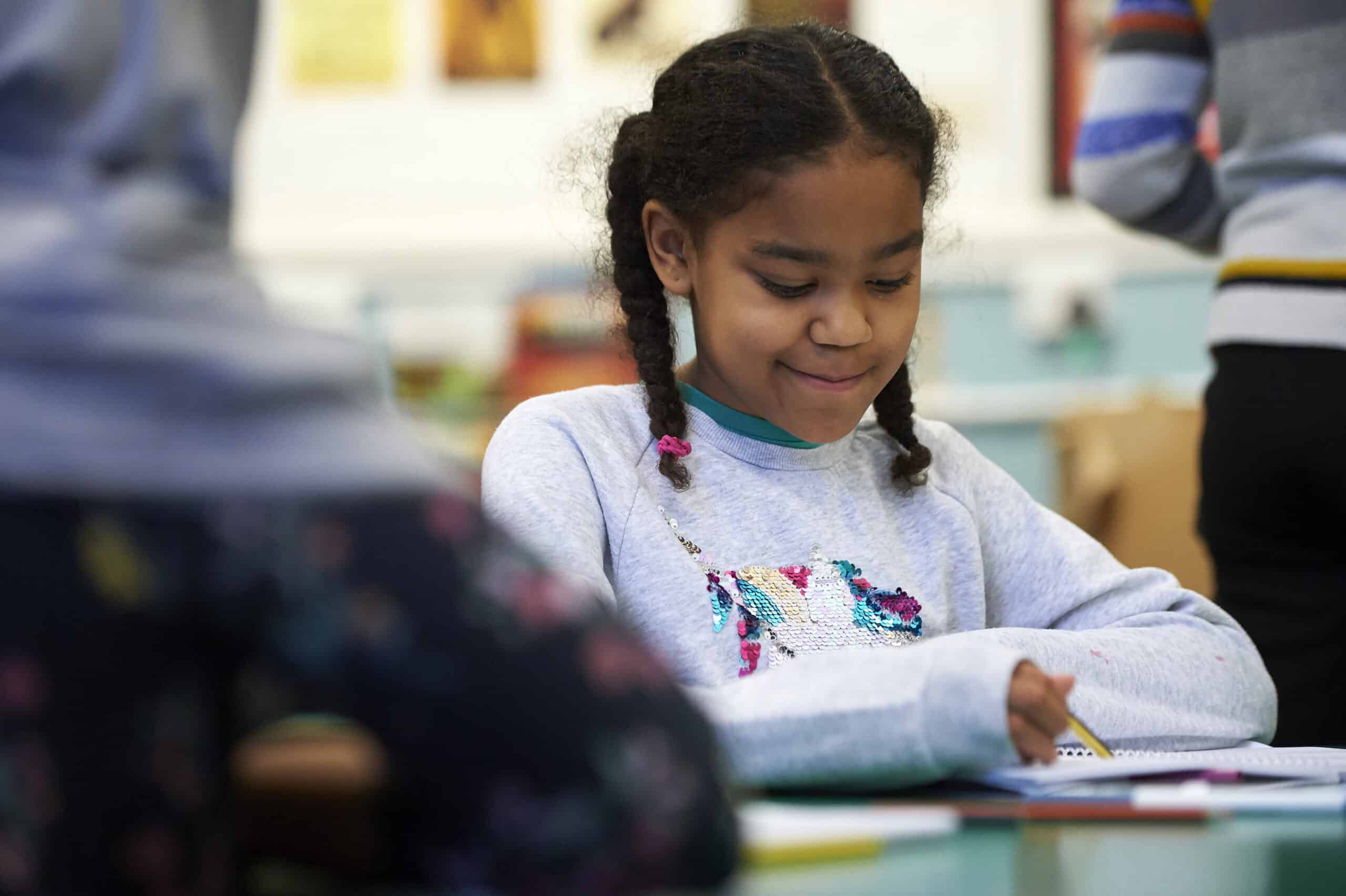
What’s Action Tutoring’s approach to safeguarding?
We work closely with schools to ensure our programmes are delivered safely. All staff and volunteers have an up-to-date enhanced DBS check. They also receive training in safeguarding and child protection before starting on the tutoring programme.
In November 2022, Action Tutoring successfully passed a thorough safeguarding audit. It met all the necessary requirements including:
- Safeguarding is an intrinsic part of organisational values and culture and is promoted through all organisational messaging.
- All personnel within the organisation reflect consistent safeguarding messaging.
- There is clarity of safeguarding messaging between all stakeholder groups engaged with the Tuition Partner (Action Tutoring).
For more information, visit our Safeguarding page (where you can find our full policy)
“Our pupils love tutoring and really look forward to their Tuesday mornings!
The real impact is in the children’s confidence and attitudes. Having worked with Action Tutoring across two schools for a number of years I am highly impressed with the on-the-ground logistics, delivery and management. Communication with the team is always good and the volunteers are highly trained and professional.”
Headteacher at a London primary school
Still looking for the answer to your question?
For more information, you can find our primary and secondary school guides, as well as some of our FAQs, below.
FAQs
If you can’t find the answer to your question, please get in touch at schoolenquiries@actiontutoring.org.uk.
Simply email schoolenquiries@actiontutoring.org.uk and one of our Head of Programmes will respond within 1-2 working days.
If your query is specific to an existing programme at your school, you can email or call your assigned Programme Manager.
Action Tutoring is always keen to hear from new schools. We seek to work with schools where the percentage of pupils eligible for Pupil Premium funding is above the national average (22%), ensuring our tutoring can be accessed where it’s needed most. If your school doesn’t quite fall into this category, please do still get in touch.
Our hubs are in the following regions: Birmingham and Coventry; Bristol; Cheshire and Merseyside; London; Newcastle and County Durham; Nottingham and Derby; Sheffield and Sussex. We work in many schools outside of these hubs too, and can work with the majority of schools located across England. We welcome enquiries from schools anywhere in the country.
Our sessions usually have a tutor to pupil ratio of no larger than 1:3, in a face-to-face, online, or virtual setting.
On our face-to-face programmes, both pupils and tutors are in school for the sessions, with our Programme Coordinator. On our online programmes, pupils are in school working on a computer with our Programme Coordinator, and our tutors connect via our online platform from anywhere in the country.
On our virtual programmes, pupils will be in school working on a computer, like with our online programme, but both the Action Tutoring Programme Coordinator and the tutors log in remotely. The Programme Coordinator is able to support virtually by observing each virtual classroom live.
For Years 5 and 6 we support pupils who are working towards expected standards. We work with Year 7 pupils who didn’t reach expected standards in their SATs. For Years 10 and 11, we work with pupils working at grades 3-5.
Each school is assigned a Programme Coordinator who is responsible for the day-to-day running of programmes and supports every session. They liaise with the school contact to provide updates and communicate any requests.
Our Programme Managers and Head of Programmes set up the partnerships initially and check in throughout the year to ensure satisfaction with the delivery of tuition.
We work in conjunction with teachers at the school to identify pupils that will benefit most from our programme, but also in line with our criteria (disadvantaged pupils/pupils at risk of not meeting expected standards). Together with the teachers, we decide the best time to run sessions and the best way to manage the logistics, ensuring we gain their input on specific areas of need.
All of our tutors are volunteers. We believe in harnessing the potential of social power to ‘do good’ without financial reward. It is central to our mission. We have an inspiring pool of tutors who support us because they believe what we do and share our values.
Our tutors range in age (from 18 to 84) and in background: undergraduates, former teachers, corporate volunteers and retired professionals. We are incredibly proud of the diverse range of volunteers we engage, who bring a wealth of experience and knowledge to the pupils they support.
All tutors must meet the criteria listed below, or have equivalent qualifications, training or work experience. We have refined this criteria over our years of operation and it is in line with other peer organisations.
- Educated to degree level, or to be studying for a degree.
- Achieved a B grade (or above) at A Level (or an equivalent qualification) in the subject they wish to tutor.
- Strong communication skills.
- Experience working with young people, or able to demonstrate that they would have the skills required.
- Empathetic towards the young people we support.
All tutors complete an online application form where they provide details of how they meet the subject knowledge and qualification criteria and any other relevant experience and motivations. Their application is carefully assessed by an Action Tutoring staff member. We interview applicants who are close to meeting the qualifications and ask a series of competency and subject-related questions to confirm their suitability.
Once accepted, tutors must then complete an Enhanced DBS check.
We’ve designed, developed and refined our tutor training process over the past 12 years. All successful tutor applicants are invited to attend ‘initial tutor training’. This is a two hour, live, small group training session than covers the following content:
- Who we are and why we exist as a charity.
- Our expectations of them as tutors and what they can expect from us.
- An exploration of the challenges faced by disadvantaged young people.
- Safeguarding, covering our policy and the use of scenario-based examples.
- An introduction to the curriculum and exam process.
- A guide of how to use our curriculum and workbooks to effectively plan sessions.
- How to manage different pupil behaviours.
- An overview of the next steps and opportunities for our online CPD modules.
Online tutors attend additional training to cover elements specific to online delivery including:
- Online-specific safeguarding considerations.
- How to adapt tutoring for online delivery.
- How to get started and make best use of our online tutoring platform (Vedamo).
We provide continuous training across the year and our Programme Coordinators and Training and Curriculum team carry out observations of our tutors and deliver feedback on an individual basis.
Pupils sit a baseline test initially, before they begin tutoring, and a progress assessment later in their programme, ensuring that tutoring focuses on the areas that they are struggling with. Programme Coordinators attend every session to monitor progress.
Baseline and progress assessment results are shared with schools. We request pupils’ ‘working at status’ before tutoring commences.



